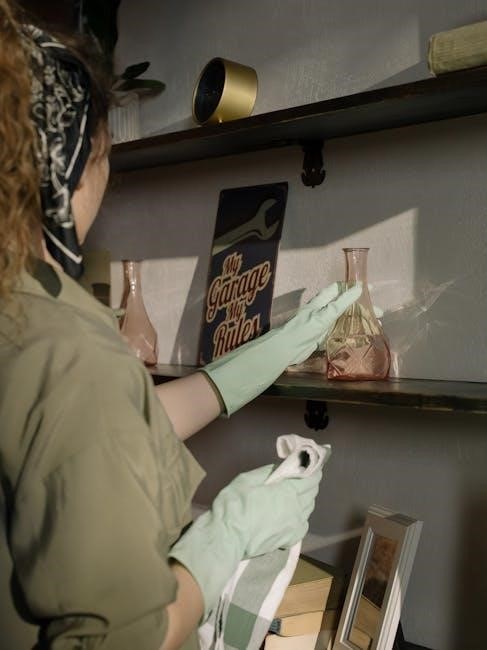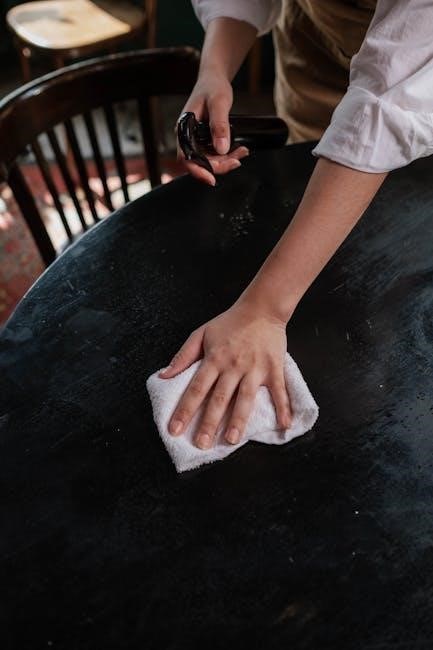Quartzite is a durable, attractive metamorphic rock primarily composed of quartz․ Formed from sand grains under intense pressure and heat, it becomes a cohesive stone․ It’s harder than marble, making it ideal for countertops due to its natural beauty and strength, which enhance home interiors․
Daily Cleaning and Maintenance
For daily care, clean quartzite surfaces with a mild, fragrance-free soap and water, using a soft sponge or microfiber cloth․ Avoid harsh chemicals and abrasive cleaners․
2․1 Recommended Methods
For daily cleaning, use a mild, fragrance-free soap mixed with warm water․ Apply the solution to the surface using a soft sponge or microfiber cloth, ensuring gentle circular motions to avoid scratches․ Regular wiping after meals or spills helps maintain the surface․ Microfiber cloths are ideal for absorbing liquids and preventing streaks․ Avoid using abrasive cleaners, acidic substances, or harsh chemicals, as they can damage the stone․ Instead, opt for pH-neutral stone care products specifically designed for quartzite․ These methods ensure the surface remains clean and preserved, maintaining its natural beauty and durability over time․
2․2 Best Cleaning Products
When it comes to cleaning quartzite, using the right products is essential to maintain its beauty and durability․ pH-neutral stone care cleaners are highly recommended, as they effectively clean without damaging the surface․ Granite Gold Daily Cleaner is a top choice, specifically designed for natural stone like quartzite․ It’s gentle yet effective, leaving no residue behind․ Additionally, stone-specific sealers and polishes, such as Granite Gold Sealer and Polish, are ideal for protecting the surface and enhancing its appearance․ Avoid using harsh chemicals, abrasive cleaners, or acidic substances, as they can harm the stone or its sealant․ Instead, opt for mild, fragrance-free soaps mixed with water for routine cleaning․ Always choose products labeled as “safe for natural stone” to ensure compatibility and longevity․ These products are designed to preserve the natural beauty of quartzite while maintaining its resilience against daily wear and tear․

The Importance of Sealing
Sealing is a critical step in maintaining the beauty and durability of quartzite surfaces․ Quartzite, while incredibly hard, is still a porous material that can absorb spills and stains if not properly protected․ Sealing creates an invisible barrier that repels liquids, preventing them from penetrating the stone and causing discoloration․ This protective layer is especially important in high-traffic areas like kitchens, where spills and splatters are common․ Regular sealing also enhances the stone’s appearance by preserving its natural luster and color․ It’s recommended to seal quartzite every 12 to 24 months, depending on usage and exposure to liquids․ Using a high-quality, stone-specific sealer ensures optimal protection without altering the stone’s texture or finish․ Neglecting to seal can lead to stubborn stains and a dull, worn appearance over time․ Proper sealing is an investment in the longevity and aesthetic appeal of your quartzite countertops․
Stain Removal and Prevention
Act quickly to blot spills, as quartzite’s porosity makes it prone to stains․ Clean with pH-neutral cleaners and avoid harsh chemicals․ Regular sealing prevents deep penetration of liquids, safeguarding the surface․
4․1 Common Stains
Quartzite surfaces are prone to stains from oil, wine, ink, and acidic substances like citrus or tomato sauce․ These stains can deeply penetrate if not addressed promptly․ Oil-based stains, such as those from cooking, can leave unsightly marks that are challenging to remove․ Red wine and ink stains are particularly stubborn due to their pigmentation․ Acidic substances can etch the surface, causing dull spots․ Immediate cleanup is crucial to prevent these stains from setting․ For oil-based stains, apply a poultice or hydrogen peroxide to break down the oil․ For ink or food stains, a gentle stone cleaner or a solution of water and mild dish soap can be effective․ Avoid harsh chemicals, as they may damage the stone or its sealant․ Regular sealing helps repel stains, but quick action is still essential for maintaining the surface’s appearance and longevity․
4․2 Prevention Tips
To prevent stains and maintain your quartzite surfaces, regular maintenance is key․ Sealing the stone every 12 to 24 months is essential to repel spills and prevent absorption․ Use pH-neutral, stone-specific cleaners to avoid etching or damage․ Clean spills immediately, especially acidic substances like citrus or tomatoes, as they can cause discoloration․ For oil-based spills, blot the area with a clean cloth instead of wiping, which can spread the stain․ Avoid placing hot items directly on the surface, as this can damage the sealant․ Use coasters and placemats for beverages and dishes to reduce the risk of stains․ Regularly wiping the surface with a microfiber cloth and water can help prevent dirt buildup․ By following these prevention tips, you can safeguard your quartzite countertops and keep them looking pristine for years to come․
Deep Cleaning Techniques
Deep cleaning your quartzite surfaces periodically ensures they remain vibrant and free from embedded dirt․ Start by sweeping or vacuuming to remove loose debris․ Mix a solution of mild, pH-neutral stone cleaner with warm water, and dip a microfiber cloth into it, wringing it thoroughly to avoid excess moisture․ Wipe the surface in a circular motion, focusing on areas with stubborn stains or buildup․ For tougher spots, apply the cleaning solution directly and let it sit for 5-10 minutes before scrubbing gently with a soft-bristle brush․ Rinse the cloth thoroughly and wipe the surface clean to remove any residue․ Avoid using abrasive tools or harsh chemicals, as they can damage the stone or its sealant․ Regular deep cleaning helps maintain the stone’s natural beauty and prevents the accumulation of grime․ Always test a small, inconspicuous area first to ensure the cleaner doesn’t cause discoloration; After cleaning, dry the surface with a clean, dry microfiber cloth to prevent water spots․ This method ensures a thorough and safe deep cleaning process for your quartzite surfaces․
Recommended Care Products
Choosing the right care products is essential for maintaining the beauty and durability of your quartzite surfaces․ Opt for pH-neutral, stone-specific cleaners that are free from harsh chemicals, abrasives, and acids․ Granite Gold Daily Cleaner is a highly recommended option, as it is specifically designed for natural stone surfaces like quartzite․ For tougher stains or buildup, consider using a non-acidic soap scum remover or a stone-specific stain remover․ Always avoid using common household cleaners, bleach, or abrasive scrubbers, as they can damage the stone or its sealant․ Microfiber cloths are ideal for cleaning, as they effectively pick up dirt without scratching the surface․ Regular sealing products, applied every 12-24 months, are also crucial to protect the stone from stains and spills․ By using the right products, you can preserve the natural beauty and extend the longevity of your quartzite countertops․ Always follow the manufacturer’s instructions for any cleaning or sealing product․
Immediate Spill Cleanup
Immediate action is crucial when dealing with spills on quartzite surfaces to prevent stains and damage․ Always clean spills right away, especially acidic substances like wine, citrus, or tomato-based products, as they can etch or discolor the stone․ Blot the spill gently with a clean, absorbent cloth or paper towel to soak up as much liquid as possible—never rub, as this may scratch the surface․ For tougher spills, mix a small amount of mild, pH-neutral soap with warm water, apply it to the area, and rinse thoroughly with clean water․ Dry the surface completely with a microfiber cloth to prevent water spots․ Avoid using harsh chemicals, abrasive cleaners, or acidic solutions, as they can damage the quartzite or its sealant․ Prompt cleanup ensures your countertops remain pristine and protected for years to come․ Regular maintenance and sealing will also help resist future spills and stains, keeping your quartzite looking its best․

Avoiding Harsh Chemicals
Avoiding harsh chemicals is essential for maintaining the beauty and durability of quartzite surfaces․ Never use abrasive cleaners, bleach, ammonia, or acidic substances like vinegar, as they can etch the surface or damage the sealant․ Similarly, avoid oven cleaners, dishwasher detergents, or solvents, as these can harm the stone or leave residue․ Instead, opt for pH-neutral, stone-specific cleaners that are gentle yet effective․ Always read product labels carefully and ensure they are safe for quartzite․ For routine cleaning, a mixture of mild soap and water is sufficient․ Harsh chemicals can dull the polished finish or create discoloration, so it’s crucial to stick to recommended cleaning products․ By avoiding harmful substances, you preserve the natural beauty and longevity of your quartzite surfaces․ Regular use of appropriate cleaners ensures a pristine appearance and prevents unnecessary damage․

Maintaining the Polished Finish
Maintaining the polished finish of quartzite surfaces requires consistent care and attention․ Regular cleaning with pH-neutral, stone-specific cleaners helps preserve the luster and prevents dullness․ Avoid using abrasive materials or harsh chemicals, as they can scratch or etch the surface․ For routine maintenance, use a microfiber cloth and water to wipe down the countertops, ensuring no streaks or residue are left behind․ If a stain occurs, address it immediately to prevent it from setting in․ Sealing the surface every 12 to 24 months is also crucial, as it protects the stone from spills and maintains its polished appearance․ Additionally, avoid placing hot objects directly on the surface, as they can cause thermal shock․ By following these steps, you can keep your quartzite countertops looking vibrant and polished for years to come․ Proper maintenance ensures the stone retains its natural beauty and durability․

Longevity Tips
To ensure the longevity of your quartzite surfaces, regular maintenance and careful habits are essential․ Sealing the stone every 12 to 24 months is crucial to protect it from stains and spills․ Always use pH-neutral, stone-specific cleaners to avoid damaging the surface․ Avoid placing hot objects directly on the quartzite, as thermal shock can cause cracks․ Clean up spills immediately to prevent them from penetrating the stone․ For daily cleaning, use a microfiber cloth and mild soap solution to maintain the surface without causing wear․ Harsh chemicals, abrasive cleaners, and acidic substances should be avoided, as they can dull the finish or etch the stone․ By following these tips, you can preserve the beauty and durability of your quartzite countertops for years to come․ Proper care ensures the stone remains a stunning and functional part of your home․
